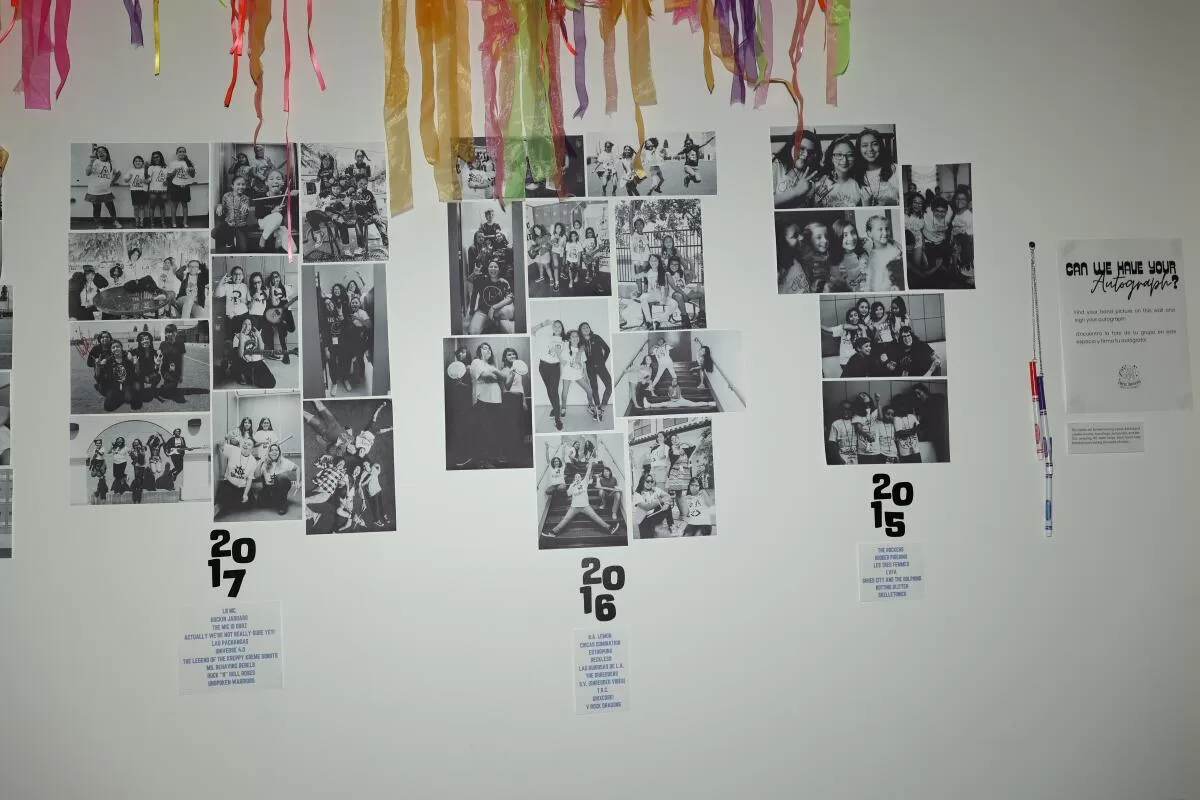At the end of her first summer camp, 11-year-old Naíma Arteaga was nervous about the final group activity she was required to do: sing in a rock band and perform onstage in front of a large audience.
The task sounds ludicrous, but Arteaga wasn’t at any ordinary camp — she was at Chicxs Rockerxs South East Los Angeles (pronounced cheek-ecks roh-kerr-ecks), where girls, trans, and gender-fluid youth learn to play instruments, create bands with one another, write original songs and perform live for a crowd during a showcase, all in just the span of a week.
“Going into that camp I was honestly a little bit more on the shy side,” Arteaga, who is now 18 and a camp volunteer, said. “I was nervous about singing, I just didn’t feel comfortable with it, but by the end of the week it really helped me boost my confidence, and it really helped me come out of my shell.”
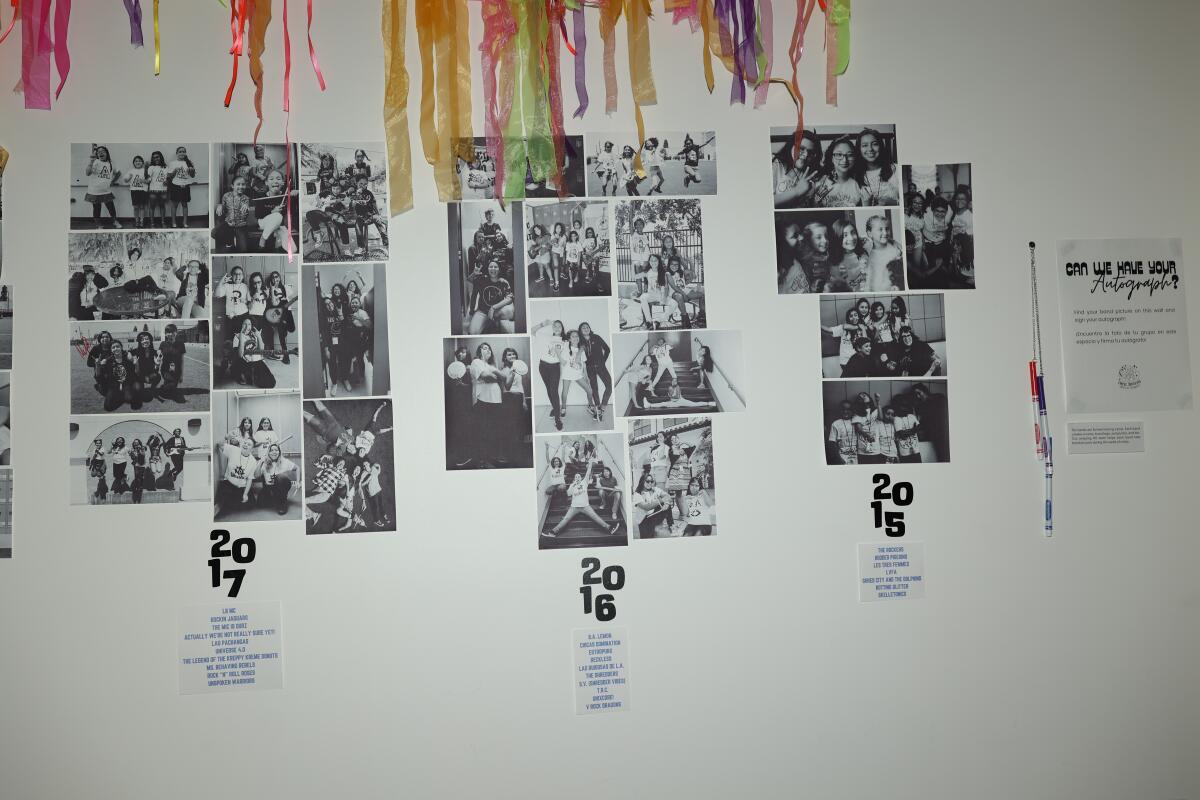
A photo exhibit of Chicana punk bands formed through the CRSELA program at the South Gate Museum.
(Michael Blackshire/Los Angeles Times)
Former campers like Arteaga are celebrating the rock camp on Saturday with an opening reception at the South Gate Museum and Art Gallery, where a special exhibit on CRSELA will be on display until Dec. 3. The exhibit highlights a decade of CRSELA’s history, with editorial photographs of students through the years, DIY flyers, camp artwork and archival objects representing colorful moments in the kids’ musical journeys.
“It’s important to make sure we are using this space to highlight and honor our communities,” Jennifer Mejia, cultural arts coordinator at the South Gate Museum and Art Gallery said. “What Chicxs Rockerxs SELA has been doing for 10 years should be celebrated and seen.”
CRSELA began as an idea in 2013 by a nonhierarchical collective of musicians who were inspired by Portland’s pioneering Rock ‘n’ Roll Camp for Girls and the larger Girls Rock Camp organizations in the U.S. CRSELA became an official nonprofit in 2014.
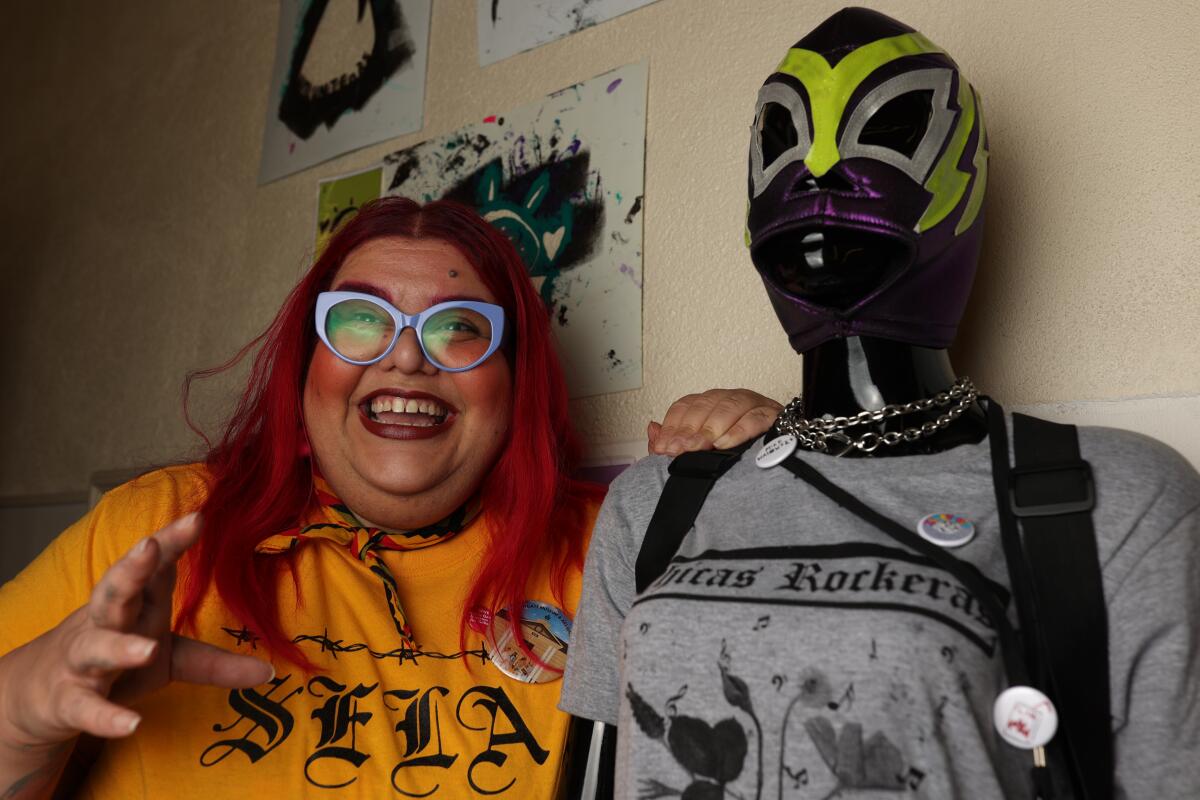
Museum Cordinator Jennifer Mejia poses for a portrait with Chicxs Rockerxs memorabilia in the background at South Gate Museum.
(Michael Blackshire/Los Angeles Times)
Like the other camps, CRSELA’s mission was to empower young girls through musical self-expression, however, CRSELA sought to make camp more accessible to low-income families, especially since other camps required a steep tuition. At CRSELA, donations from the public cover the costs of the program for each student.
“Chicxs Rockerxs is tuition-free, and when you have these fees it does deter people, so [rock camp] was something that they definitely wanted to take to their communities,” Priscilla Hernandez, an organizer with CRSELA, said.
The camp also wanted to make the experience more inclusive for historically disenfranchised neighborhoods throughout South L.A. This appealed to Hernandez, who as a teenager in 2013, received a scholarship to attend a Girls Rock Camp in another city. She had a positive experience but says she was cognizant of the glaring fact that few campers shared her background.
“I definitely didn’t see a lot of people who looked like me there,” Hernandez said.
After reaching the age limit at the Girls Rock Camp, Hernandez wondered what to do next. She heard about CRSELA and felt aligned with its values, so she decided to join in 2017 as a volunteer, teaching bass to students. She eventually became an official core organizer, a “Comx” (pronounced cohm-ecks) as their group calls them, a gender-neutral version of the Spanish word “Comadre,” which translates to “godmother.”
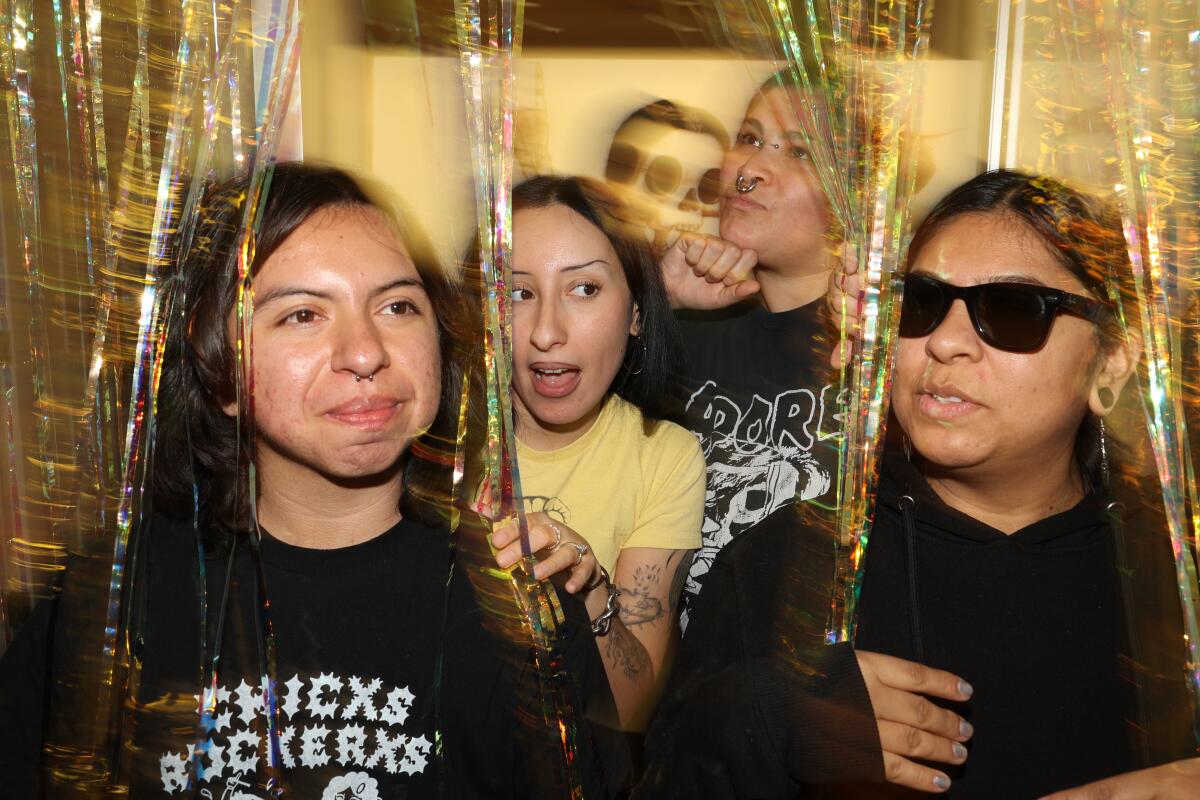
Miles Recio, from left, Priscilla Hernandez, Angie Barrera and Vikki Gutman pose at the South Gate Museum.
(Michael Blackshire/Los Angeles Times)
“The message resonated with me a lot when I was aging out of [Girls Rock] camp, [CRSELA] wanted to incorporate a lot of things about Latinidad and pieces that were in Spanish, and that was something that wasn’t part of the other camps,” Hernandez said.
Programming for the South East L.A. camp goes beyond music education. The kids take part in a wide range of artistic workshops to express their creativity, such as zine-making and screen-printing. During lunch, they’re visited by drag queens and local bands who perform for the kids to provide play and entertainment.
Students entering the program are divided into two groups: the Bidi Bidis and the Bom Boms. The monikers for the two classifications pay homage to the song “Bidi Bidi Bom Bom” by Tejano legend Selena Quintanilla. The Bidi Bidis consist of kids ages 8 to 11 while the Bom Boms are ages 12 to 17. When Arteaga joined CRSELA as a student in 2017 (the same year Hernandez became a volunteer), she was part of the Bidi Bidis, and even though she was joined by kids younger than her, Arteaga said it didn’t diminish the experience. The band allowed her to discover her self-confidence and power.
“The second that me and my band stepped onstage, I felt like I was a different person,” the former CRSELA student said. “My parents had even told me that they were like, ‘Wow,’ that they had never seen me like that before. I don’t know what happened, I was just doing my thing up there.”
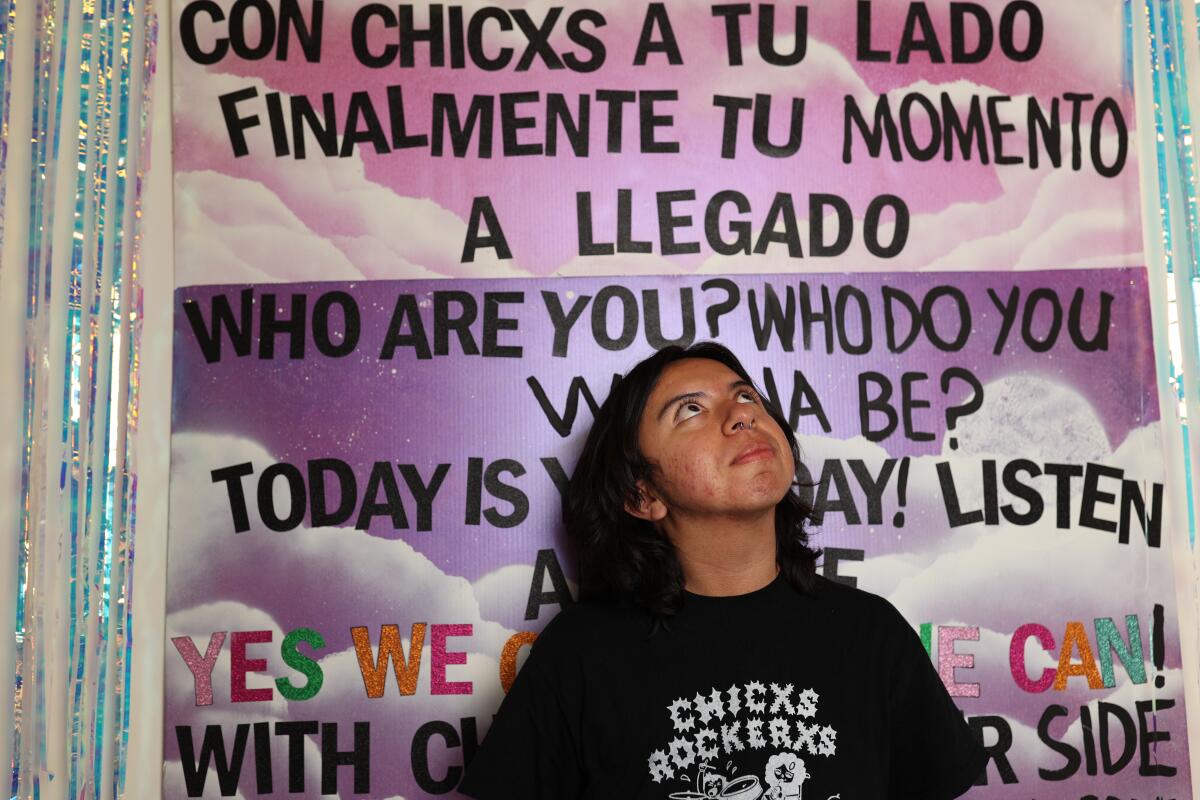
Miles Recio poses for a portrait with Chicxs Rockerxs memorabilia at the South Gate Museum.
(Michael Blackshire/Los Angeles Times)
This was a breakthrough moment for Arteaga, who felt compelled to sign up every summer thereafter. She even tried out the drums, which she ended up loving so much that she never stopped playing them. In 2023, she reached her final year as an eligible camper. Resolved to make the most of it, she made what she says is her “best” band — a punk act with her cousin, a fellow Bom Bom — but her graduation from the program was bittersweet, and Arteaga admits she cried immediately after the showcase.
“I loved the camp so much, I didn’t want that feeling to end, I’m glad that I still get the opportunity to go back as a volunteer, but it was very heartbreaking to me,” she said.
At the 10th annual camp this past July, Arteaga completed her first year as a volunteer band coach with the Bidi Bidis, the same group she started out with seven years ago. She hopes to re-create her camper experience for others and continue to propagate CRSELA’s work in L.A.
“It changed my life and it’s had such a big impact for me. I feel like it’s so important to keep [CRSELA] around because a lot of stuff goes on in the world and you just never know what’s happening in someone’s home or in their own community, it’s a way to get away from all of that and a way to escape reality,” Arteaga said. “This is the perfect place for people who want to learn more about themselves, learn more about music, get to know people. It’s an amazing place for anybody to be at.”
